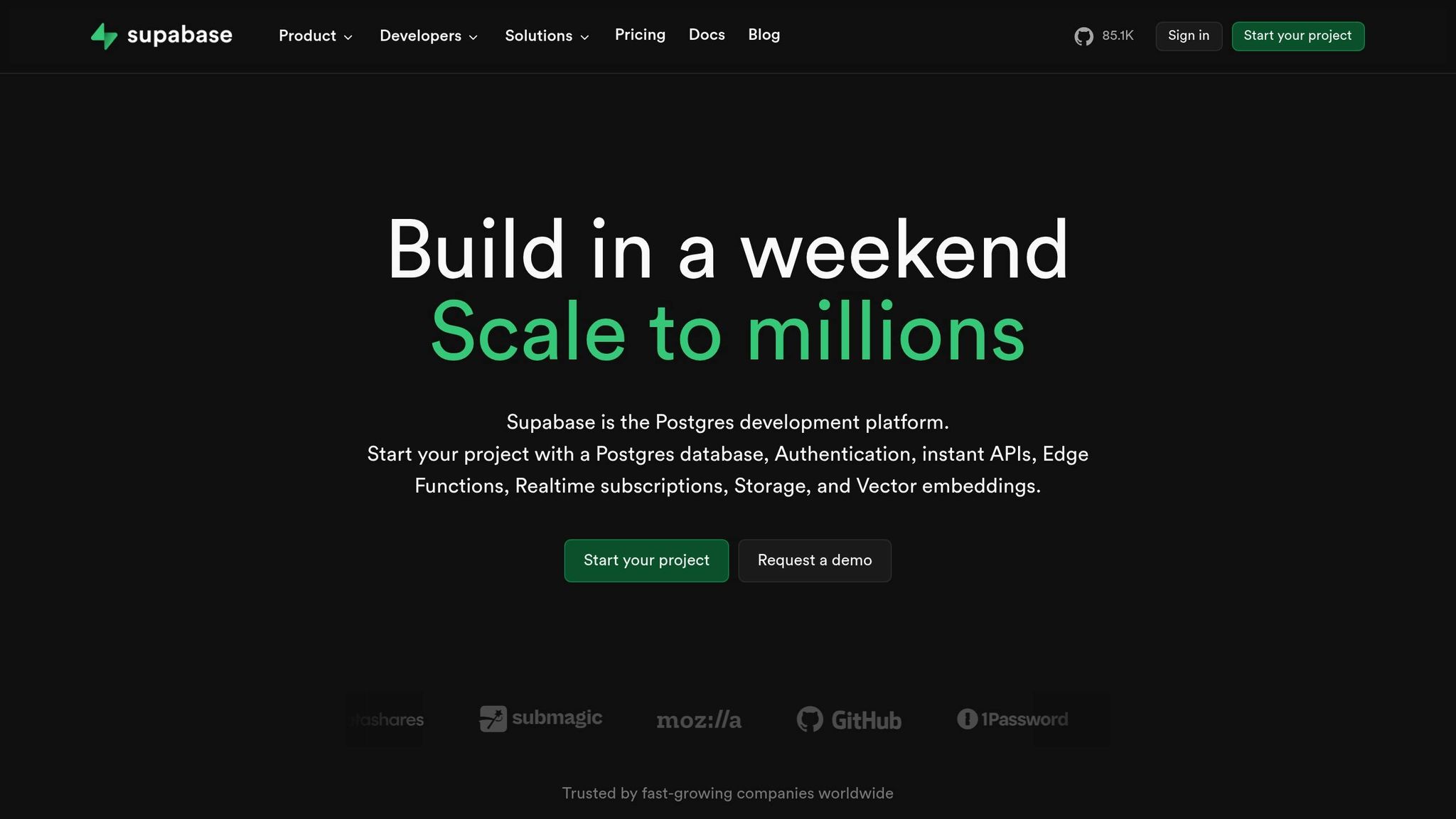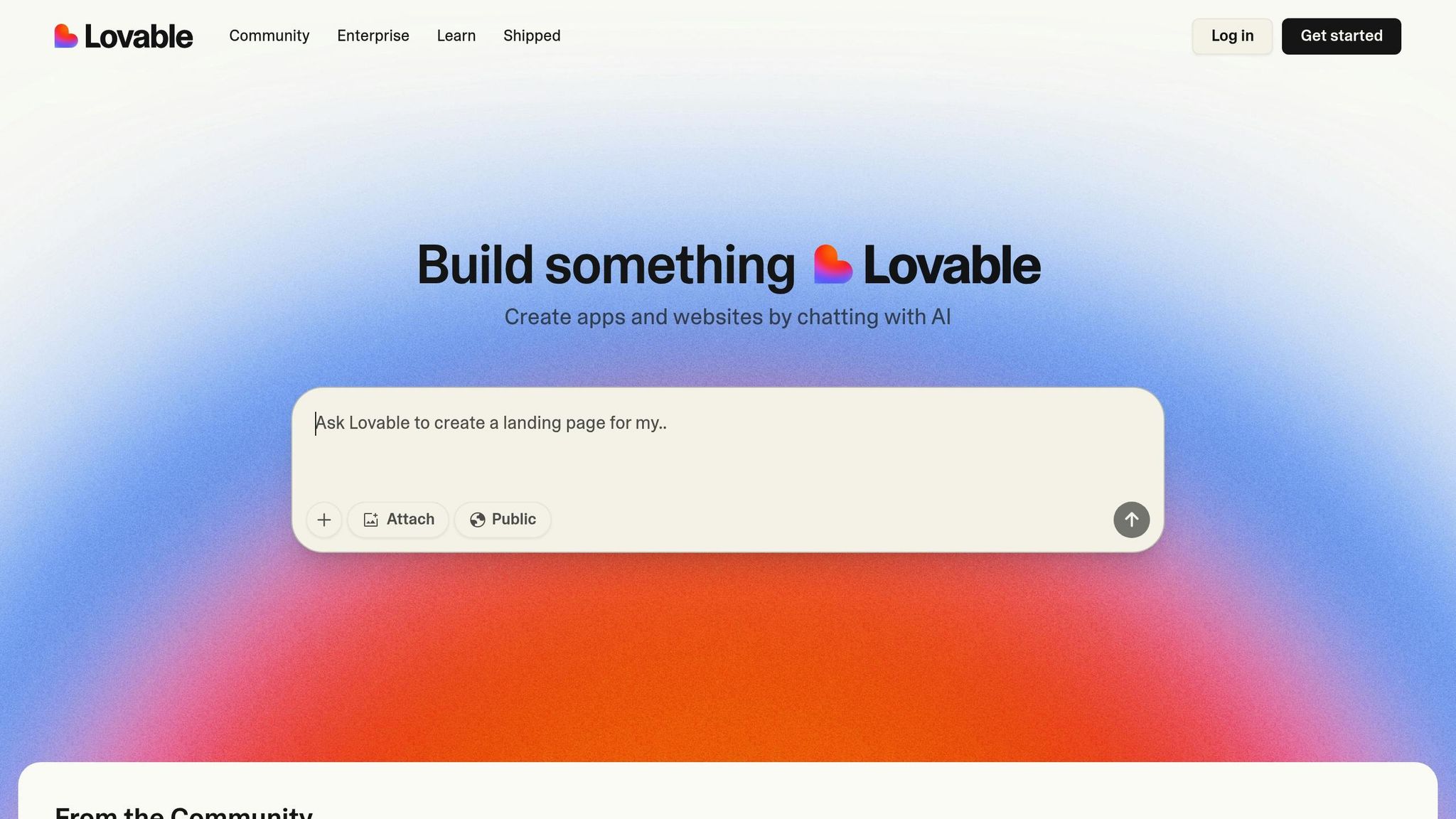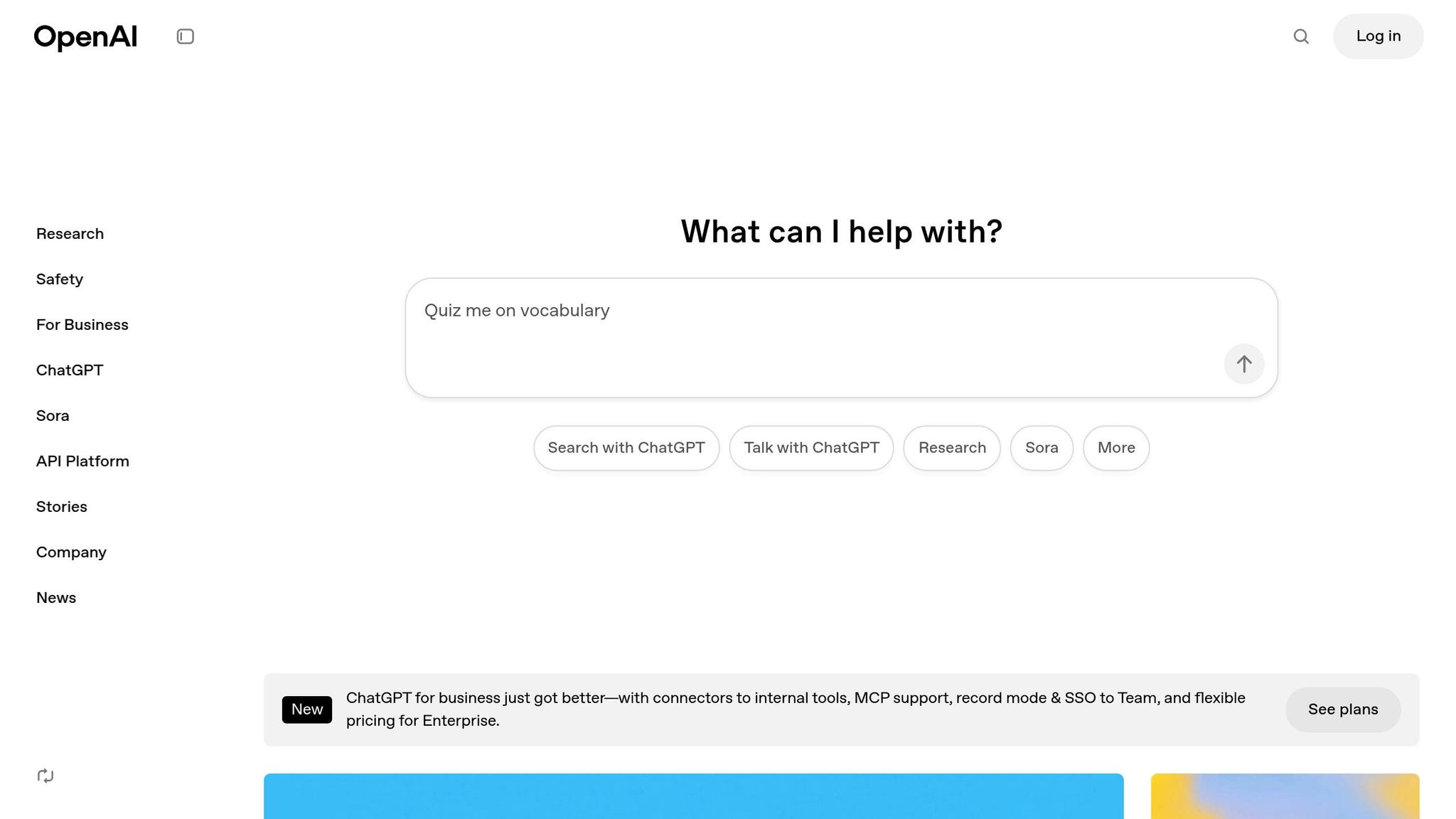How to Secure API Keys in Lovable.dev Apps
Learn essential strategies for securing API keys in browser-based applications to protect sensitive data and prevent unauthorized access.

When building apps with Lovable.dev, keeping your API keys secure is critical. These keys function like passwords, granting access to external services such as OpenAI or Stripe. However, since Lovable.dev apps run in the browser, traditional key storage methods don't work - they risk exposing your keys to anyone inspecting your app's code. Here's how you can protect them effectively:
- Use Supabase Secrets: Store API keys securely on the server, keeping them out of frontend code.
- Leverage Supabase Edge Functions: Route API calls through server-side functions to prevent exposing keys to the client.
- Enable Built-in Key Detection: Lovable.dev flags hardcoded keys in your code and prompts secure storage.
- Set Up Supabase RLS Policies: Apply granular access controls to your database for additional security.
- Run Security Scans: Lovable.dev's AI scans your app for vulnerabilities, helping you fix issues before deployment.
- Avoid Hardcoding Keys: Never embed keys directly in frontend code, even temporarily.
Keeping API keys secure with Supabase vault

Common API Key Security Risks in Lovable.dev Apps

Lovable.dev's focus on frontend development brings specific security challenges, making the proper management of API keys a top priority.
Frontend Code Exposure
Embedding API keys directly into frontend code is a risky practice. In Lovable.dev apps, this can lead to immediate vulnerabilities since these keys become visible through browser developer tools. What might seem like a convenient shortcut during development can quickly turn into a severe security flaw.
AI Code Generation Issues
Lovable.dev's AI-driven workflows add another layer of risk. Sensitive information can unintentionally be included in AI prompts, creating potential exposure. To address this, Lovable.dev has implemented safeguards, blocking around 1,200 private API keys from being directly inserted into code every day.
However, risks don’t stop there. AI-generated code can sometimes assign permissions too broadly or misconfigure access controls. For instance, if Row Level Security (RLS) policies in Supabase are not properly set, sensitive data might become accessible to unintended users. This highlights the importance of carefully reviewing AI-generated outputs for potential security oversights.
What Happens When API Keys Get Exposed
The consequences of exposed API keys can be severe. Beyond unauthorized access, attackers can misuse leaked keys, leading to financial damage through overuse or unexpected charges. A notable example occurred in February 2023, when environment files at Lowe's Market were publicly accessible. These files contained AWS S3 access tokens and third-party API keys. One compromised GrocerKey API allowed attackers to access sensitive customer data, including partial credit card details, addresses, and spending history. It also enabled unauthorized actions like placing orders, issuing refunds, and resetting passwords.
Such exposures can result in regulatory fines and lasting reputational damage. Studies show that 35% of exposed secrets are found in JavaScript files, which underscores the heightened risk for frontend applications. A security review of Lovable.dev's showcase platform revealed 303 vulnerable endpoints across 170 projects, representing about 10.3% of the 1,645 projects analyzed. Additionally, exposed API keys can lead to intellectual property theft, granting competitors access to proprietary algorithms, custom models, or other confidential business assets.
How to Store and Manage API Keys Safely
To minimize security risks, Lovable.dev suggests a multi-layered approach to protect your API keys. By leveraging Lovable.dev's built-in features and Supabase's encrypted storage, you can ensure your keys remain secure.
Store Keys with Supabase Secrets
Supabase Secrets acts as a secure vault for your API keys, encrypting them on the server so they never appear in client-side code. This prevents credentials from being exposed through browser developer tools or frontend code inspection.
To get started, access the Secrets tab in your Supabase dashboard. Assign clear labels to your API keys so you can reference them easily in your code.
For sensitive keys - like those used with OpenAI or Stripe - it's crucial to pair encrypted storage with server-side functions. Cybersecurity expert cyberseb_ emphasizes this best practice to keep keys secure and inaccessible to end users.
Once your keys are stored securely, route your API calls through Edge Functions for added protection.
Use Supabase Edge Functions for API Calls
Edge Functions provide a secure way to access your stored secrets, ensuring that API calls are made on the server side rather than exposing them to the client.
Lovable.dev simplifies this process by auto-generating Edge Functions to handle your API calls securely. For example, when integrating OpenAI's API, Lovable.dev creates a function that retrieves your API key from Supabase Secrets and processes the API call server-side.
This approach was highlighted in March 2025 by No Code MBA during a tutorial for a content remixer app. They showcased how Supabase Edge Functions securely stored and used an OpenAI API key, routing calls through the Edge Function instead of directly from the frontend.
Additionally, Lovable.dev's Supabase Integration 2.0 streamlines troubleshooting. It automatically reads Edge Function logs and displays error messages directly in the chat interface, allowing you to resolve issues efficiently without compromising security. This feature aligns with Lovable.dev's focus on building secure and reliable applications.
Lovable.dev's Built-in Key Detection
To further safeguard your application, Lovable.dev includes a built-in system that detects and blocks hardcoded API keys. If a key is detected in frontend code, the platform issues a warning and prompts you to use proper secret storage and server-side API calls instead.
This detection mechanism prevents thousands of private keys from being exposed daily. By addressing accidental disclosures, it helps maintain the security of your app and its sensitive data.
Making Secure API Calls in Lovable.dev
Lovable.dev simplifies the process of integrating APIs while keeping security at the forefront. Once your API keys are securely stored in Supabase Secrets, you can connect external services to your Lovable.dev app without putting sensitive information at risk.
Step-by-Step Security Process
Lovable.dev has built-in safeguards to prevent you from accidentally exposing API keys. For instance, if you paste an API key into your code, the platform will automatically detect it and warn you against hardcoding it into your frontend. Instead, it guides you through a secure workflow:
- Reference Supabase Secrets: Use the securely stored API key from Supabase Secrets.
- Create a Supabase Edge Function: Lovable.dev generates an Edge Function to handle the API call server-side.
- Frontend Calls the Edge Function: Your app’s frontend communicates with the Edge Function, which then interacts with the external API.
This setup ensures that API credentials remain on the server side, reducing the risk of exposure. Routing calls through Edge Functions not only protects your keys but also gives you greater control over how APIs are used. This approach is especially critical, as seen in incidents like the BeyondTrust breach in late 2023, where exposed API keys led to severe consequences for the organization.
OpenAI Integration Example

A practical example of this process can be found in a content remixer app tutorial by No Code MBA, updated in March 2025. The tutorial demonstrates how to securely connect OpenAI's API to a Lovable.dev app while following strict security measures.
Instead of embedding the API key directly into the app's frontend, the tutorial outlines how to create an Edge Function to handle OpenAI API calls server-side. The Edge Function retrieves the encrypted API key from storage, makes the API request, and returns the result to the frontend. This way, the frontend never has direct access to the API key.
This method aligns with OpenAI’s security guidelines, which emphasize avoiding client-side key deployment in environments like browsers or mobile apps. It also mirrors Google Cloud's advice on API security:
"The client should pass requests to the server, which can add the credential and issue the request."
Ongoing Security with Policies and Monitoring
Securing API keys isn’t a one-and-done task - it’s an ongoing process that grows with your application. At Lovable.dev, this means combining continuous monitoring with robust access controls. To take it a step further, you can enhance your security setup by implementing Supabase Row Level Security (RLS) policies.
Set Up Supabase RLS Policies
Row Level Security (RLS) policies in Supabase act as a gatekeeper for your data, ensuring users can only access or modify information they’re authorized to see. Think of these policies as filters applied to every database query. Supabase recommends enabling RLS on all tables within exposed schemas, like the public schema, to enforce granular authorization rules.
Here’s how RLS works: you enable it on your tables and define SQL rules that function like WHERE clauses. For instance, if you’re managing user profiles, you could create a policy that restricts access to each user’s own data:
create policy "User can see their own profile only."
on profiles
for select
using ((select auth.uid()) = user_id);
Supabase provides helper functions like auth.uid() and auth.jwt() to simplify policy creation. To ensure maximum security, make it a rule to enable RLS on every table in your exposed schema.
Run Regular Security Scans
Even with strict access policies in place, regular security scans are essential to catch potential vulnerabilities. Lovable.dev’s AI-powered security scanning goes beyond surface-level checks, identifying risks that could compromise your API keys. For example, the platform prevents roughly 1,200 private API keys from being directly embedded in code every day.
Before deploying your app, Lovable.dev provides warnings from both the Supabase security advisor and its advanced AI scanner. These alerts help you address common issues like XSS vulnerabilities, poor input sanitization, and weak authentication protocols. For production-ready applications, you can request a manual security review by selecting the "Review Security" option in the publish dialog or simply asking Lovable to "review my app's security". This review examines your entire codebase, including Supabase RLS policies, and offers actionable recommendations to resolve any security gaps.
In fact, Lovable’s security scans have uncovered vulnerabilities across several websites, prompting the addition of features that ensure Supabase access controls are properly configured before publishing.
"Vibe coding has done wonders to democratize software development. We can't expect novice developers to audit low-level security configs. If a tool makes it easy to deploy an app, it should also make it hard to accidentally expose sensitive data." – Amjad Masad, Replit CEO
To stay ahead of potential threats, enable the "Continuous Scan" feature during development. This provides real-time feedback and analysis as you build.
Never Hardcode API Keys
Hardcoding API keys - even temporarily - is a risky practice. It can lead to accidental commits or deployments that expose sensitive information. Instead, follow secure workflows by storing your keys in Supabase Secrets and using Supabase Edge Functions for API calls. Ensure your frontend interacts only with these secure functions.
This approach not only protects your keys but also ensures that best practices are baked into your development process. With continuous monitoring in place, even if a key is mistakenly hardcoded, the system will flag it before it becomes a serious issue. This proactive stance keeps your application secure at every stage.
Using Lovable.dev Community Resources for Security
In addition to the built-in security measures, tapping into the collective expertise of the Lovable.dev community can take your API key security to the next level. The Lovable.dev ecosystem provides a wealth of resources to help developers enhance the security of their apps. Instead of tackling security challenges on your own, you can benefit from the shared experiences and proven techniques of other developers. These community-driven insights work hand-in-hand with the platform's technical safeguards to strengthen your overall security approach.
Find Security Tutorials and Guides
Loveableapps.ai is your go-to destination for security-related learning within the Lovable.dev ecosystem. Here, you’ll find tutorials, guides, and best practices tailored specifically for developers working on Lovable.dev apps. These resources cover a wide range of topics, from basic API key protection to advanced security strategies.
The site includes step-by-step tutorials that walk you through secure development workflows. These guides are designed to complement Lovable.dev’s built-in security features and help you implement secure practices effectively.
For those looking to refine their skills further, Loveableapps.ai also provides best practices for prompt engineering with a focus on security. These resources guide you in crafting secure prompts when interacting with Lovable.dev's AI, ensuring that security remains a priority throughout your development process.
Additionally, you’ll find scaling and growth guides that address security considerations for apps as they expand. These resources offer insights into tackling challenges like managing sensitive data and maintaining security as your user base grows.
Learn from Other Developers
The creator showcase on Loveableapps.ai connects you with experienced developers who have successfully implemented secure API integrations in their Lovable.dev projects. These seasoned creators share practical techniques and strategies that you can apply to your own applications.
You can also engage directly with the Lovable.dev Discord community, where developers discuss security challenges and solutions in real time. The app directory on Loveableapps.ai is another valuable resource, showcasing apps built on Lovable.dev. While backend details aren’t visible, you can often spot patterns in how secure apps are structured, offering inspiration for your own projects.
The community frequently shares insights on specific topics like Supabase RLS policies, providing guidance on how to implement these effectively within Lovable.dev apps.
When gearing up for production deployment, the community can be an invaluable resource for navigating Lovable.dev’s manual security review process. Developers often share tips on what reviewers look for and how to prepare your app for a thorough assessment. These shared experiences can help you identify and address potential issues early, ensuring a smoother review process.
Key Points for API Key Security in Lovable.dev
Protecting API keys in Lovable.dev apps is essential to safeguarding your app and its users. Lovable.dev employs multiple layers of protection to ensure sensitive data stays secure.
Avoid hardcoding API keys into your frontend code. Lovable.dev actively detects hardcoded API keys and alerts you if any are found. Instead of embedding keys directly, describe your intended API integration to Lovable.dev, which will guide you through a secure setup. This approach forms the backbone of secure deployments on the platform.
"Lovable handles API keys securely through Supabase, ensuring safety and ease of use."
– Stephane & Vivasat Lovable
Use Supabase Secrets and Edge Functions to store API keys securely and route calls through the server, keeping credentials out of client-side code.
Take advantage of Lovable.dev's built-in security tools to proactively identify potential vulnerabilities. Features like AI-powered security scans and enhanced RLS policy reviews help analyze your app for weaknesses.
Conduct a manual security review before launching to production. Even when automated scans show no issues, a manual review can uncover hidden problems that might otherwise go unnoticed.
Regularly update and monitor your security practices. Rotate API keys frequently and address all security warnings flagged by Supabase's security advisor and Lovable.dev's AI security scanner before publishing.
These strategies have proven effective in real-world scenarios. For instance, in January 2025, a startup scaled its operations by integrating OpenAI models via Lovable.dev, enhancing decision-making and product personalization. Similarly, a SaaS company successfully upgraded its payment system by integrating the Stripe API through Lovable.dev, achieving seamless transactions and strong security.
FAQs
How can Supabase Secrets and Edge Functions help protect API keys in Lovable.dev apps?
Supabase Secrets and Edge Functions offer a reliable way to securely manage API keys within your Lovable.dev apps by keeping them out of reach from client-side code. Secrets let you securely store sensitive data on the server, while Edge Functions process API requests on the server side, ensuring that your keys remain hidden from end users.
Using these tools together helps protect your app's sensitive information from unauthorized access, all while delivering a smooth experience for your users.
Why is hardcoding API keys in frontend code risky, and how does Lovable.dev help protect them?
Hardcoding API keys directly into frontend code is a risky practice. It leaves them exposed to potential theft, misuse, and unauthorized access. Since frontend code is accessible to anyone who inspects it, sensitive credentials can easily become vulnerable. This can lead to serious issues like data breaches, service disruptions, or unexpected expenses.
Lovable.dev steps in to tackle this problem by detecting and notifying users when sensitive keys are hardcoded. Beyond just alerts, it promotes secure alternatives, such as leveraging backend services or using platforms like Supabase to handle API keys safely. By adopting these secure practices, developers can protect their applications and ensure API keys are managed responsibly, reducing the risk of security compromises.
How does Row Level Security (RLS) in Supabase improve the security of Lovable.dev apps?
Row Level Security (RLS) in Supabase
Row Level Security (RLS) in Supabase is a powerful feature that helps safeguard your app by restricting access to specific rows in a database. This is done based on user roles or predefined conditions. When RLS is turned on, users can only view or interact with the data they are explicitly permitted to access, keeping sensitive information out of reach for unauthorized users.
For apps built on Lovable.dev, where secure data management is a priority, RLS provides an added layer of protection. It blocks unauthorized API access, ensuring user privacy is maintained and aligning with best practices in data security. This level of control makes RLS a must-have for creating secure and trustworthy applications.



